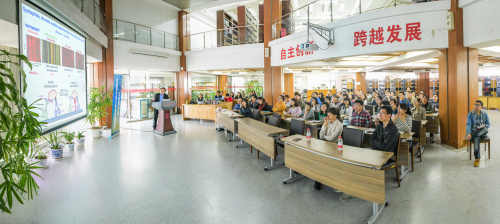On April 14, 2017, Prof. Zu-hang Sheng visited Institute of Biophysics, CAS and gave a lecture entitled “Moving or anchoring mitochondria for the maintenance of synaptic transmission, nerve regeneration, and mitochondrial quality control”. The lecture was hosted by Prof. Hong Zhang, and was part of the special lecture series named “Shizhang Bei Lecture” of Institute of Biophysics. Mitochondria are cellular energy power plants essential for neuronal growth and synaptic function. Neurons utilize specialized mechanisms driving mitochondria transport to and anchoring them in distal axons and at synaptic terminals. The balance between motile and stationary mitochondria is regulated in response to changes in axonal and synaptic physiology. Research into the mechanisms regulating mitochondrial motility is thus an important emerging frontier. They previously identified syntaphilin as a static anchor specific for axonal mitochondria. In the presentation, Prof. Sheng first discussed how mitochondrial motility influences synaptic variability, one of the most notable characteristics in synaptic physiology. They revealed that the motility of axonal mitochondria was one of the primary mechanisms underlying the wide variability of presynaptic strength. Then Prof. Sheng discussed their recent exciting findings that mitochondrial transport was essential to facilitate nerve regeneration. They revealed that reduced mitochondrial motility and energy deficits in injured axons were intrinsic mechanisms controlling regenerative capacity in mature neurons. While axonal mitochondrial transport progressively declines with maturation, injury induces acute mitochondrial depolarization and ATP depletion in injured axons. Thus, mature neuron-associated decline of mitochondrial transport causes local energy deficits. Strikingly, enhancing mitochondrial transport via genetic manipulation facilitated regenerative capacity in mature neurons by replenishing healthy mitochondria in injured axons, thereby rescuing energy deficits. Finally, Prof. Sheng discussed their recent studies showing why mitochondrial transport is critical for the maintenance of mitochondrial quality control in healthy and neurodegenerative neurons. Taken together, Prof. Sheng summarized understanding deficits in mitochondrial trafficking and energy supply benefit development of new strategies to stimulate axon regeneration after injury and diseases. Prof. Zu-hang Sheng gave the lecture with vivid words, rigorous logic and great passion, which can be a lively lesson for the audience. Investigators from Institute of Biophysics attended the lecture. After the lecture, Prof. Zu-hang Sheng and the audience shared their views on the issues of common interest. 

|